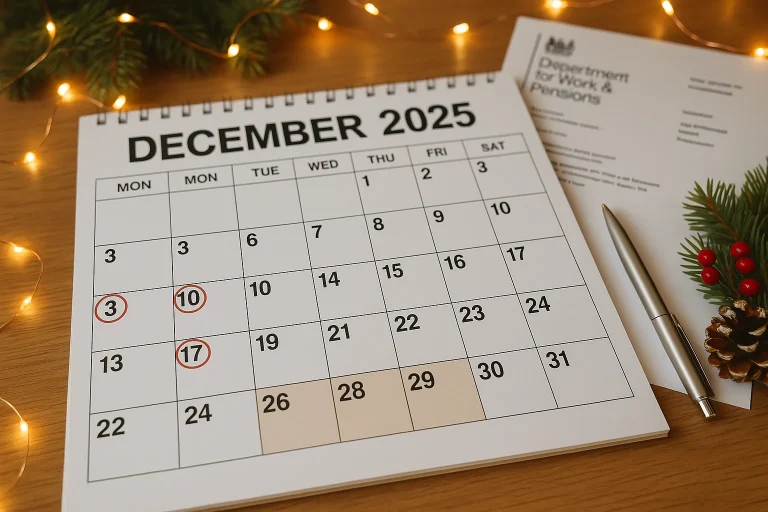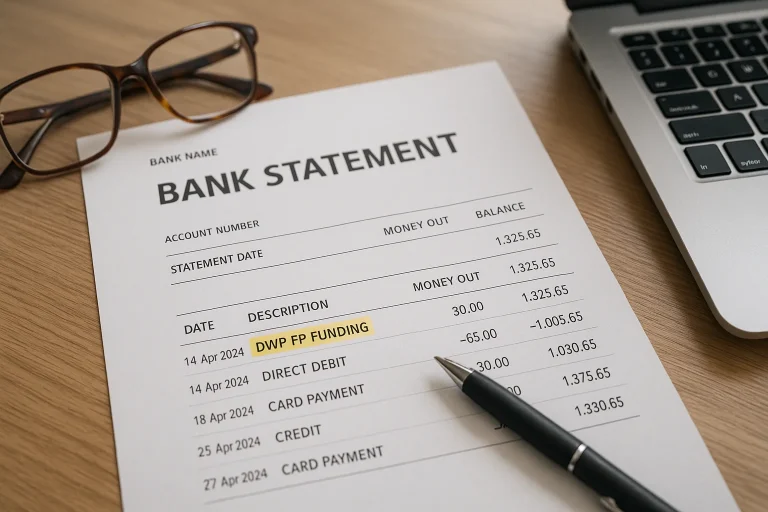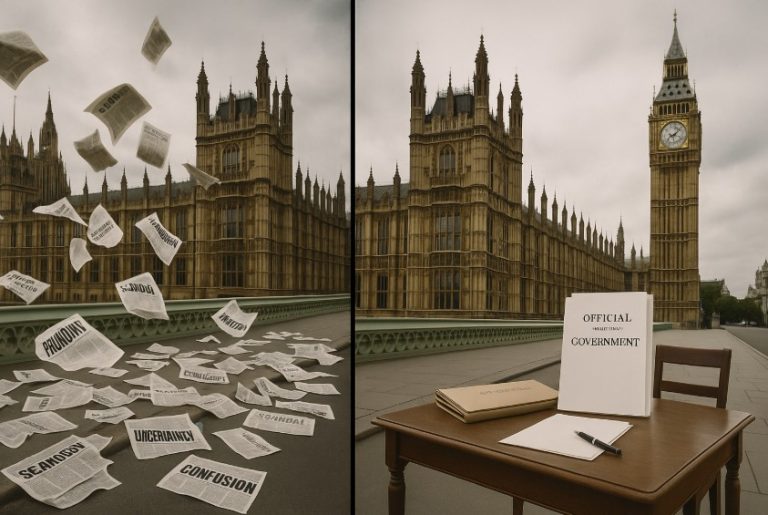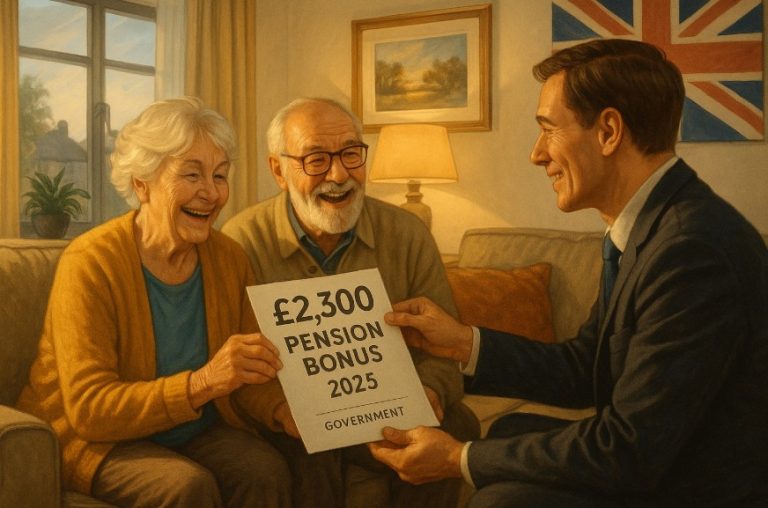The UK has been grappling with extreme weather conditions, leading to droughts and enforced water restrictions.
Hosepipe bans, also known as Temporary Use Bans (TUBs), are becoming increasingly common as water companies attempt to manage limited water resources.
But what does this mean for individuals with mobility or medical issues? Specifically, are Blue Badge holders exempt from hose pipe bans? This blog explores the legalities, exemptions, and practical implications for disabled individuals during water restrictions.
What Is a Hose Pipe Ban and Why Is It Implemented?
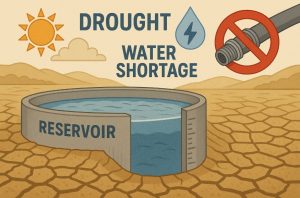
A hosepipe ban is a temporary restriction put in place by water companies to conserve water during periods of extreme drought or significantly reduced rainfall.
These bans are officially known as Temporary Use Bans (TUBs) and are governed by the Water Industry Act 1991, along with amendments from the Flood and Water Management Act 2010.
During dry seasons, especially in the summer months, water levels in reservoirs, rivers, and groundwater sources drop.
To avoid long-term shortages that could affect public health and essential services, water companies introduce bans to curb non-essential use. Common activities that are prohibited during a hosepipe ban include:
- Watering gardens or lawns with a hosepipe
- Filling paddling pools, hot tubs, or ornamental fountains
- Washing vehicles, patios, and exterior windows
In 2025, multiple water companies including Southern Water, South East Water, Thames Water, and Yorkshire Water enforced hosepipe bans due to the driest spring the UK has seen in over a century.
Who Typically Qualifies for Exemptions During a Hose Pipe Ban?
Although hosepipe bans apply to the majority of domestic users, certain individuals and groups may qualify for exemptions. These exemptions are carefully defined to ensure that those with essential needs are not negatively impacted.
Exemptions often apply to:
- People with documented medical or mobility issues that require increased water use
- Gardeners using approved drip irrigation systems with pressure regulation
- Newly planted lawns or vegetation during the first 28 days
- Businesses such as farmers and car wash operators under strict conditions
Water companies assess exemption requests on a case-by-case basis. It is important for consumers to read the specific guidelines issued by their supplier, as eligibility may vary by region and water firm policy.
Are Blue Badge Holders Automatically Exempt from Hose Pipe Bans?
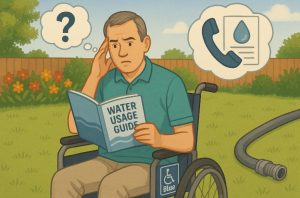
The question of whether Blue Badge holders are automatically exempt from hosepipe bans is a common point of confusion.
While many water companies in the UK do recognise the unique needs of disabled individuals, exemptions are not always automatic and usually depend on the policies of each individual water provider.
Blue Badge holders typically qualify for exemption based on mobility or medical needs, but this recognition often requires a formal process.
Water companies need to verify the specific circumstances of each individual, as not all disabilities impact water use in the same way.
For instance, someone who requires regular vehicle cleaning due to limited mobility or someone who depends on a garden for therapeutic activities may have stronger grounds for exemption than others.
In the case of Southern Water, the company has clearly stated that customers who are on their Priority Services Register which includes Blue Badge holders and those receiving the WaterSure tariff are exempt from current hosepipe bans.
This allows eligible individuals to continue using a hosepipe for essential purposes without the risk of fines or enforcement actions.
It’s also important to note that the exemption is not blanket permission to use water freely. Southern Water and other providers encourage even exempt households to reduce their water consumption where feasible, showing that these exemptions are a form of accommodation rather than unrestricted usage.
Water companies may ask for supporting evidence such as:
- A copy of the Blue Badge
- Proof of registration on the Priority Services Register
- Medical documentation, in some cases
Without submitting such documents, a Blue Badge holder might not be officially recognised as exempt, even if they would otherwise qualify.
There are also distinctions between companies. For example:
- Thames Water and South East Water both require vulnerable customers to be registered with their support services
- Yorkshire Water evaluates exemption requests based on specific needs and documentation
- Other providers like Wessex Water or Anglian Water currently have no bans in place but have similar exemption processes when restrictions are active
Additionally, exemptions are generally limited to essential activities. A Blue Badge holder may be permitted to:
- Clean a vehicle used for transporting a disabled person
- Water a therapeutic garden that supports mental or physical wellbeing
- Fill a paddling pool or bath for medical use
However, recreational uses like washing patios or filling ornamental ponds usually remain restricted, even for exempt individuals.
In short, while Blue Badge holders are among those most likely to qualify for a hosepipe ban exemption, they must actively apply or register with their water provider.
The process is often simple, but taking the time to confirm exemption status is essential for avoiding penalties and ensuring continued access to necessary water use.
Why Are Blue Badge Holders Exempt from Hosepipe Bans?
Blue Badge holders are often exempt from hosepipe bans because many have medical or mobility-related needs that require additional water use.
The exemption is based on the principle of reasonable adjustments for people with disabilities, in line with the Equality Act 2010.
Here’s why exemptions apply:
-
Mobility Challenges: Some individuals need to wash vehicles or mobility equipment like wheelchairs or scooters regularly for health and safety.
-
Health Requirements: Water may be necessary for hygiene, therapy (e.g., hydrotherapy pools), or managing a specific medical condition.
-
Physical Limitations: Using alternatives like a watering can or bucket may not be feasible, especially for those with limited strength or dexterity.
Water companies, such as Southern Water, recognise this by including Blue Badge holders in their Priority Services Register and providing case-by-case exemptions during bans. However, users are still encouraged to conserve water wherever possible.
How Do Water Companies Handle Blue Badge Holder Requests?
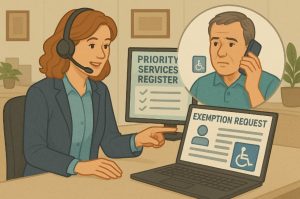
Water companies across the UK have structured systems in place to support customers who may need additional assistance during a hosepipe ban.
This includes individuals with mobility limitations or medical needs, such as Blue Badge holders.
However, the process is not automatic and requires the individual to take proactive steps to register and provide relevant documentation to be considered for an exemption.
The primary method that water companies use to identify and manage support for vulnerable customers is through their Priority Services Register (PSR).
This register is a free and confidential service that allows customers to receive tailored support based on their personal circumstances.
Being on the PSR doesn’t just help during water restrictions; it also ensures priority service during outages, planned maintenance, or emergencies.
When a Blue Badge holder contacts a water company regarding a hosepipe ban exemption, the company typically follows this general process:
1. Initial Contact and Verification
The customer is required to get in touch with their water supplier via customer service channels—usually by phone or online forms. During this stage, the company will:
- Ask whether the individual is currently registered on the Priority Services Register
- If not, provide instructions or forms to complete the registration
- Request evidence such as a copy of the Blue Badge, proof of a medical condition, or confirmation of eligibility for the WaterSure tariff
This verification is necessary because not all disabilities or mobility issues automatically qualify someone for an exemption. The company needs to understand the specific impact on water usage.
2. Assessment of the Request
Once the documentation is submitted, the water company reviews the request in line with their current hosepipe ban policies. This involves assessing:
- The type of water use being requested (e.g. garden watering, vehicle washing)
- The necessity of this use in relation to the individual’s disability or medical condition
- Whether the exemption aligns with the company’s legal obligations and conservation goals
Each company has internal criteria based on government guidance, operational capacity, and ethical considerations, ensuring that only those with genuine, essential need receive exemptions.
3. Decision and Confirmation
After reviewing the submission, the customer is notified of the outcome. If approved, the water supplier:
- Confirms which activities the exemption covers
- Updates the individual’s customer account to reflect their exempt status
- May send written confirmation or official documentation stating that the person is permitted to use a hosepipe for specified tasks during the ban
Some companies may offer advice or alternatives, such as using watering cans or rainwater where possible, even if an exemption is granted. Others may provide free or discounted water-saving devices to help reduce usage.
4. Ongoing Support and Monitoring
Water companies often maintain periodic checks or updates for those on the PSR. If a hosepipe ban is extended or lifted, the company will inform exempt customers about any changes that affect their status.
In some cases, companies may also:
- Reconfirm documentation for long-term exemptions
- Provide access to emergency water delivery for those with severe medical conditions
- Partner with local authorities to ensure consistent support for vulnerable households
Example Process for Blue Badge Exemption Handling
| Step | Description |
| Contact Supplier | Customer calls or applies online to report exemption need |
| Submit Documentation | Proof of Blue Badge or medical condition submitted |
| Assessment by Provider | Water company reviews the need and use case |
| Confirmation of Exemption | Exemption granted for specified uses (e.g. car washing, garden watering) |
| Account Update | Priority Services Register updated with exemption status |
It’s important to note that different water companies may follow slightly different procedures, though the core principles remain consistent. For example:
- Southern Water and Thames Water require registration on their PSRs and documentation
- Yorkshire Water offers exemptions but only after a formal assessment
- South East Water may provide advice before confirming exemption status, especially in borderline cases
Water companies strive to balance compassionate customer service with resource conservation, making it essential for Blue Badge holders to be clear, timely, and accurate in their requests.
By registering and supplying the right information, they ensure both compliance with the law and continued access to the water they need for daily life.
What Should Blue Badge Holders Do to Apply for an Exemption?
Applying for an exemption involves a few simple steps but must be done proactively. Blue Badge holders should not assume that their status is automatically known to the water company.
Steps to apply include:
- Contacting the water supplier directly or visiting their website
- Registering for the Priority Services Register
- Uploading or emailing required documents such as a copy of the Blue Badge or medical certification
If approved, the household will receive confirmation that the hosepipe restrictions do not apply to them for specific permitted uses.
Are There Other Support Measures for Vulnerable or Disabled Customers?
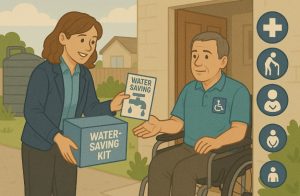
UK water companies provide additional layers of support for customers who are elderly, disabled, or medically vulnerable. These measures are intended to ensure that essential water needs are met, even during times of restriction.
Some of the key support services include:
- WaterSure Tariff: A scheme that caps the cost of water bills for low-income households with high water use due to medical needs
- Home visits and assessments: Offering advice and sometimes free fittings or repairs to help manage water use
- Emergency supply services: Delivery of bottled or tanker water in cases of outages for vulnerable households
Table: Summary of Common Support Measures for Vulnerable Customers
| Support Service | Description | Eligibility |
| WaterSure Tariff | Caps water bills for high-use households | Low income + medical need or 3+ children |
| Priority Services Register | Ensures support during outages or bans | Elderly, disabled, or those with health issues |
| Free water-saving kits | Includes tap aerators, shower timers, etc. | Available upon request to all customers |
| Emergency delivery | Bottled water provided during supply interruptions | Registered vulnerable households |
These services ensure that critical water needs are met without burdening those who already face health or mobility challenges.
Can Local Authorities Influence Exemption Decisions?
Local authorities, although not decision-makers in the administration of hosepipe bans, play a supportive role in facilitating exemptions and helping residents access services.
Councils can assist individuals in gathering the correct paperwork or understanding their rights and entitlements.
Authorities may:
- Provide documentation to verify medical or mobility conditions
- Help residents connect with water suppliers
- Raise awareness through community outreach and support groups
They can also collaborate with social care teams to ensure that those who need exemptions are guided through the process correctly.
What Are the Consequences of Violating Hose Pipe Bans?
While the intent behind hosepipe bans is conservation, they are legally binding. Violating a hosepipe ban can result in financial penalties, even for those who may not be aware of the restrictions.
Consequences include:
- A fine of up to £1,000 under the Water Industry Act 1991
- Possible investigation and enforcement visits
- Increased monitoring of water usage in affected areas
Blue Badge holders who are exempt must still ensure their exemption is officially recorded with their water supplier. Using a hosepipe without documented exemption could still result in a penalty if challenged.
How Can Blue Badge Holders Conserve Water Without Breaking Rules?
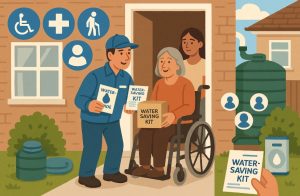
Even with an exemption, Blue Badge holders are encouraged to adopt water-saving practices. This helps reduce strain on water resources and ensures continued public support for necessary exemptions.
Simple conservation measures include:
- Using a watering can instead of a hosepipe for gardening
- Installing a water butt to collect and reuse rainwater
- Reusing grey water from baths or cooking for outdoor cleaning
- Avoiding unnecessary vehicle washing
Table: Water Conservation Tips for Blue Badge Holders
| Action | Benefit | Recommended Frequency |
| Use a watering can | Reduces water flow and waste | Regular gardening use |
| Collect rainwater | Replaces mains water for outdoor use | Year-round |
| Reuse bathwater (grey water) | Maximises water utility | As needed |
| Limit vehicle washing | Conserves 150+ litres per wash | Monthly or less |
By incorporating these practices, Blue Badge holders not only adhere to the guidelines but also contribute to the wider goal of sustainable water use.
Conclusion
Blue Badge holders may be exempt from hosepipe bans, but registration with the Priority Services Register is usually required.
Each water company has its own rules, so it’s vital to check directly with your provider. Even with an exemption, responsible water use is encouraged.
By staying informed and proactive, Blue Badge holders can access the support they need while helping conserve resources during the UK’s increasingly frequent periods of drought and water restrictions.
FAQs About Hose Pipe Ban and Blue Badge Holder Exemptions
Are all Blue Badge holders automatically exempt from hosepipe bans?
No. While many companies recognise Blue Badge holders as eligible, registration on the Priority Services Register is typically required.
What is the Priority Services Register?
It is a database used by water companies to identify and support vulnerable customers who may need additional services or exemptions.
How do I know if my water provider offers exemptions?
Check your water company’s website or call customer support to verify exemption policies specific to your postcode or condition.
Can I use a hosepipe to wash my mobility vehicle?
If you’re exempt under mobility or medical grounds, yes—but water companies still recommend using a bucket where possible to conserve water.
What if I’m denied an exemption?
You can appeal by providing more detailed documentation or contacting your local council for additional support.
Can I water my garden if I’m disabled but not a Blue Badge holder?
Yes, potentially. If your condition affects your ability to carry water, you may still qualify under medical exemption terms.
Do hosepipe bans apply to grey water use?
No. You are allowed to use non-mains water like grey water or rainwater through a hosepipe, even during a ban.

